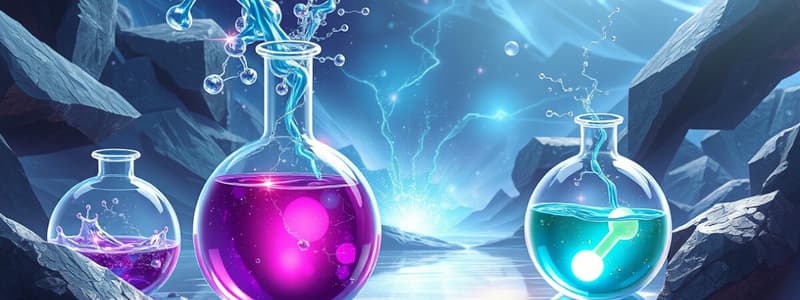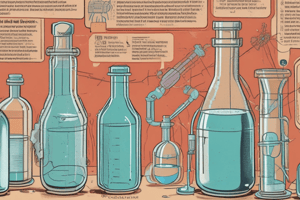Podcast
Questions and Answers
Which of the following describes strong electrolytes?
Which of the following describes strong electrolytes?
- Solutions made by molecules that do not conduct electricity
- Substances that partially dissociate into ions in solution
- Substances that mostly remain as neutral molecules in solution
- Substances that completely dissociate into ions when dissolved in water (correct)
Which of the following are examples of weak electrolytes?
Which of the following are examples of weak electrolytes?
- NH₃ (correct)
- HCl
- NaOH
- HF (correct)
What is a nonelectrolyte?
What is a nonelectrolyte?
- A substance that does not dissociate and does not conduct electricity (correct)
- A strong acid that fully dissociates
- An ionic compound that dissolves in water
- A compound that dissociates into ions in water
What is the chemical formula for hydrochloric acid?
What is the chemical formula for hydrochloric acid?
What are some examples of strong electrolytes?
What are some examples of strong electrolytes?
List all nonelectrolytes.
List all nonelectrolytes.
Which of the following acids is classified as a weak electrolyte?
Which of the following acids is classified as a weak electrolyte?
What is the definition of weak electrolytes?
What is the definition of weak electrolytes?
Flashcards are hidden until you start studying
Study Notes
Electrolytes Overview
- Electrolytes are substances that dissociate into ions in water and conduct electricity.
Strong Electrolytes
- Complete dissociation into ions in solution.
- Examples include:
- HCl (hydrochloric acid)
- HBr (hydrogen bromide)
- HI (hydrogen iodide)
- HClO₄ (perchloric acid)
- HNO₃ (nitric acid)
- H₂SO₄ (sulfuric acid)
- NaOH (sodium hydroxide)
- KOH (potassium hydroxide)
- All soluble ionic compounds
Weak Electrolytes
- Exist primarily as neutral molecules, with only a small fraction as ions.
- Examples include:
- CH₃CO₂H (acetic acid)
- HF (hydrofluoric acid)
- NH₃ (ammonia, also a weak base)
- HCN (hydrogen cyanide)
Non-Electrolytes
- Do not dissociate in solution and do not conduct electricity.
- Common examples:
- H₂O (water)
- CH₃OH (methanol)
- C₂H₅OH (ethanol)
- C₁₂H₂₂O₁₁ (sucrose)
Summary Lists
- Strong Electrolytes: HCl, HBr, HI, HClO₄, HNO₃, H₂SO₄, NaOH, KOH
- Weak Electrolytes: CH₃CO₂H, HF, HCN, NH₃
- Nonelectrolytes: H₂O, CH₃OH, C₂H₅OH, C₁₂H₂₂O₁₁
Key Concepts
- Strong electrolytes facilitate electrical conduction in solutions.
- Weak electrolytes provide limited ionization and thus lower conductivity.
- Nonelectrolytes dissolve in water without ion formation, leading to non-conductive solutions.
Studying That Suits You
Use AI to generate personalized quizzes and flashcards to suit your learning preferences.




